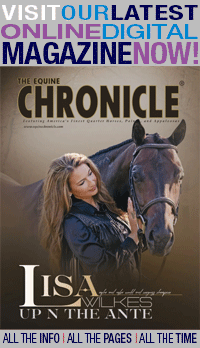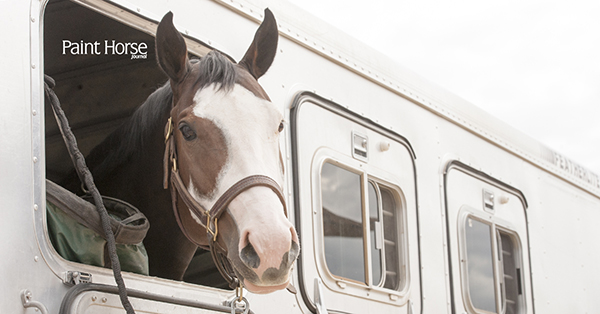APHA Addresses New ELD Mandate and Potential Effect on Horse Industry
The ELD (Electronic Logging Devices) Mandate, a result of the 2012 “Moving Ahead for Progress in the 21st Century” (MAP-21) bill, mandates the use of electronic logging devices on commercial vehicles to track hours of service, including driving time and mandated rest periods for drivers. This rule impacts people who have been keeping written log books for the purpose of reporting commercial hours of service and could significantly impact the horse community due to increased scrutiny of compliance regarding these rules; horse safety and welfare during transport could also be in jeopardy.
Horsemen and -women are encouraged to contact their Congressmen about this bill and its impact (see contact info at bottom). APHA is also joining forces with other major equine associations and the American Horse Council to present a unified front to request a one-year exemption for livestock haulers and to develop ways to revise the law in a way that’s more appropriate to the horse industry as a whole.
Horses are included as “livestock” in the MAP-21 bill, and operators hauling horses are subject to the ELD Mandate if they meet the following conditions:
- Using a commercial vehicle; this is the case if:
- Your truck/trailer is used for business
- Your truck/trailer is used as a business expense
- You collect payment for hauling non-personal horses
- You can win money competing with your personal or client horses
- You are sponsored, which might include having stickers/emblems on your trailer
- Your vehicle has a Gross Vehicle Weight Rating of more than 10,000 pounds and is used for your business or the intent to make a profit, or is involved in interstate commerce (USDOT and state DOT numbers might also be required)
- Activities fall outside exemptions allowed for agriculture and livestock transport; exemptions include:
- Transport of livestock within 150 air mile radius from the source
- In this case, work and driving hours are not limited and an ELD is not required. Hours of service restrictions do apply beyond the 150 air-mile radius (unless vehicle/driver meets limited exemptions, such as if it’s for no more than 8 days in a 30-day period—see fmcsa.dot.gov)
- “Occasional transportation of personal property by individuals not for compensation nor in the furtherance of a commercial enterprise”
- Per the FMCSA website, this exemption applies to those who transport personal horses with a commercial motor vehicle under those guidelines, provided: (1) The underlying activities are not undertaken for profit, i.e., (a) prize money is declared as ordinary income for tax purposes, and (b) the cost of the underlying activities is not deducted as a business expense for tax purposes; and, where relevant; (2) corporate sponsorship is not involved. Drivers must confer with their State of licensure to determine the licensing provisions to which they are subject.
- Transport of livestock within 150 air mile radius from the source
- Required to obtain a commercial driver’s license (CDL) based on the weight of your truck and trailer. Gross Vehicle Weight Rating (GVWR) is noted by the manufacturer and includes passengers and cargo:
- Combination of vehicles with a gross combined weight rating of 26,001 pounds or more
- Single vehicle with a GVWR of 26,001 pounds or more
*Obtaining a CDL often requires testing, passing a physical and fees.
One of the key points of the MAP-21 guidelines are mandates for drive and rest periods. Under this law, a commercial driver may drive for 11 hours in a 14-consecutive-hour period before a mandatory “stop-and-rest” requirement goes into effect for the next 10 consecutive hours; a 30-minute break is also required within the 11-hour driving period (maximum consecutive driving time is 8 hours before the 30-minute break is required).
MAP-21 regulations go into effect December 18, 2017; a 90-day grace period has been granted, with the mandate going into full effect April 1, 2018.
Full MAP-21 details are at FMCSA—search “ELD Rule.”
ELD Frequently Asked Questions
 Make Your Voice Heard
Make Your Voice Heard
These guidelines largely do not take into consideration the concerns of horsemen and –women, whether they are professionals, non-pros or hobbyists. In addition, many in the equine community fall under these regulations for commercial vehicles or the need for a CDL, but might not currently be compliant.
“CDL regulations are firmly in place and will not be impacted by the ELD rule going into effect. The American Horse Council encourages you to reach out to ‘commercial vehicle enforcement’ officials in local or state police departments for specific enforcement policies within their respective states on CDL requirements,” AHC Director of Health and Regulatory Affairs Cliff Williamson said.
AHC President Julie Broadway noted the ELD mandate could significantly impact equine safety, health and welfare during transport, among other implications.
“This rule has the potential to pose threats to the biosecurity, welfare and competitiveness of our nation’s horses. The AHC has been and will continue to work on behalf of the equine industry in Washington D.C. to receive an important delay in enforcement until such point as our horse owners, haulers and enthusiasts can be assured that our concerns are addressed,” she said.
To help take action, contact your U.S. Senators and Representatives to share concerns about how the MAP-21 guidelines affect the equine community and request that they support the one-year exemption for livestock haulers that’s been requested by the American Horse Council and other animal agriculture groups, as well as their request to address the significant impact the mandate could cause to the health, safety and welfare of animals in transit.
Contact
Representatives: http://www.house.gov/representatives/find-your-representative
Senators: https://www.senate.gov/general/contact_information/senators_cfm.cfm











